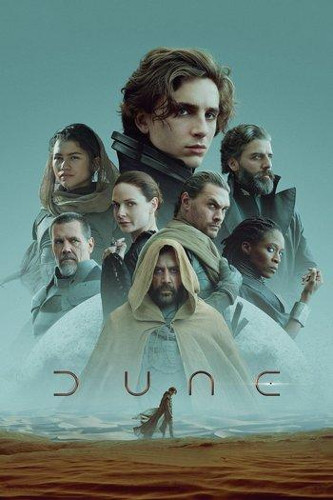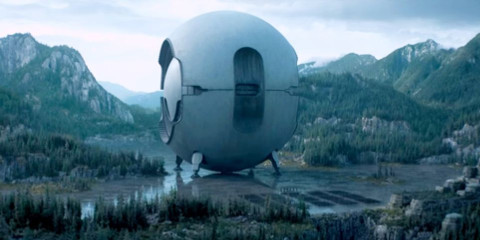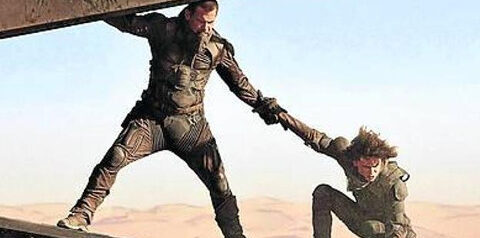Dune (2021)
Directed by: Denis Villeneuve
Written by: Denis Villeneuve, Eric Roth, Frank Herbert, Jon Spaihts
Starring: Jason Momoa, Oscar Isaac, Rebecca Ferguson, Timothee Chalamet
USA
IN CINEMAS NOW
RUNNING TIME: 156 mins
REVIEWED BY: Dr Lenera

It is the year 10191 and the universe is dominated by the presence of the spice Melange which extends life and aids in interstellar travel. It exists in only one place: the desert planet of Arrakis, also known as Dune. The Padishah Emperor, Shaddam Corrino IV, becomes concerned that the House of Atreides on the planet Caladan is becoming too powerful, so he plots with their enemies, the House of Harkonnen, to allow the Duke Leto Atreides to guard Dune and its spice ore, where they will be vulnerable to a surprise attack from the Harkonnens. Leto’s son, Paul, the result of a centuries-long breeding program by the Bene Gesserit witches [of whom his mother is one] to produce a super being called the Kwisatz Haderach, is plagued by dreams of a strange future. On Arrakis, the natives, known as the Fremen, have a legend that tells of the coming of a messiah from another world….

One of of the movie forums I frequent, the discussion on Dune has been reduced to the usual reductive silliness, an argument over whether it’s boring or not. We have those who found it tedious, largely because it doesn’t have enough action, and then those who consider the others to be stupid and better off watching a Transformers film. Well I’ll say one thing; there’s a decent amount of action if that’s what’s important, in fact far more than in No Time To Die which has a similar running time. The final third is full of it. In any case, perhaps a more important question is; have director/screenwriter Denis Villeneuve, along with his fellow scribes Eric Roth and Jon Spaihts [a weird combination of one good writer and one pretty poor one, just check out the credits of each], managed to successfully transpose the first half [well, actually the first two thirds but we’ll get back to that later] of Frank Herbert’s 1967 novel to the screen? It’s been a great many years since I read it, but, as I already mentioned in my review of the 1984 adaptation, I found it to be a slog, crammed full of chat which rarely advanced the plot. Sorry, Herbert fans – though as I said it was a great many years ago and I might feel differently if I read it now. And the story is nowhere near as complicated as many make out, which meant that, when I first watched David Lynch’s divisive version when I was 15, I had no problem following it despite all those critics who supposedly got totally lost. Said 1984 version was heavily truncated just before release, especially in its second half, so the idea that Villeneuve was intending to make two films out of Dune [if it had been Peter Jackson we’d be getting three] was no doubt exciting for fans who were thrilled that far more of the book was going to make it onto the screen – yet I honestly wondered how much of this extra material we really needed.
Well, Villeneuve’s film is certainly talky, but the majority of scenes do advance the plot and don’t outstay their welcome – in fact [and this is something I didn’t expect to say] some of these scenes could have been longer. The roles of some important characters are almost as small as we saw in 1984 and there’s not much here that we couldn’t gleam back then as long as we paying attention. The main difference in terms of the writing side of things is that Lynch [who of course also wrote his version], with perhaps some pushing from producer Dino de Laurentiis and the studio executives, frontloaded much of the information as to what was going on, while Villeneuve, Roth and Spaihts give it to the audience gradually; for example we don’t even meet the Emperor or Feyd. This does make things tidier and provides some nicer world-building. However, making two films rather than one means that a great deal of what’s in this first part is set-up material for what happens in the second part. Therefore, while watched with the second part it may work well, it’s not that satisfying a viewing experience on its own, even though I’ll repeat that [in my opinion anyway] it’s not boring [never a term I like to use anyway, as I feel that in the right mood 2001: A Space Odyssey can be just as absorbing as Star Wars] or even slow. The biggest problem with it is that for some strange reason Villeneuve decided to drench the whole thing in a desaturated brown gold hue, most other colours being conspicuous by their absence, while a distinct lack of imagination is present in things like sets or costumes [the latter one of the few things the miniseries from 2000 excelled in].
A small amount of narration also begins this version before we’re on Arrakis and the Fremen clashing with Harkonnens who are mining Melange. And before you ask; no, there are no Guild Navigators here, and that’s fine seeing as on the literary side of things they don’t turn up for a few more books. But we quickly get the idea that this is a universe steeped in history by having a scene set in a graveyard; it may not sound like a notable decision to do this but it’s certainly a shrewd one, because it almost subconsciously lets us know that there’s a past here, not just a present, and that provides some weight. Something that wasn’t clear in previous adaptations is that Duke Leto, despite being apprehensive about being moved from one planet to another, sees potential in allying with the Fremen, seeing it as the first step toward increasing the Atreides’ standing in the Landsraad, the body that represents all the Great Houses, even though the Fremen themselves aren’t particularly enthused. I can’t remember if this is in the book but this version has a theme of colonialism, the poor Fremen just wanting to be left alone. Well, it’s a favourite theme at the moment and one which some of us are tiring of, though it’s not constantly brought up here. Leto’s concubine Lady Jessica is an acolyte of the Bene Gesserit, an exclusive sisterhood wielding advanced physical and mental abilities. She was instructed by the Bene Gesserit to bear a daughter whose son would become the messianic Kwisatz Haderach, but instead she bore Leto a son. As before, we see Paul being trained by Leto’s aides, Duncan Idaho, Gurney Halleck and the Mentat Thufir Hawat, while Jessica trains him in Bene Gesserit disciplines and the the Reverend Mother Gaius Helen Mohiam subjects Paul to a deadly test to assess his impulse control, which he passes. On Arrakis, we benefit from getting more of a feeling of the place which, appropriately considering some of the terms being used, is Middle Eastern-like here, though not as much as in 2000.

While there’s obviously more detail here and there, the story progresses in the way that we know, and it’s definitely interesting to see how familiar scenes are handled, though in some cases the similarity is very close to what we’ve seen before. The first appearance of one of the worms is restricted to a view of its mouth, saving the suspense for later. The subplot of the traitor who ruins things is even smaller than before; a cut scene involving him recently went online and should have been left in. Villeneuve and co. still had to reduce the presence of some characters, while a section of Paul and Jessica in the desert brings up interesting more questions about adaptation and truncation. The 1984 version chopped this material down to almost nothing with only minor adjusting of the overlaying narrative, yet it didn’t suffer for it [though of course some of the cutting elsewhere wasn’t to the film’s advantage]. And Villeneuve goes way over the halfway point of the novel, something that may not be a problem as long as part two doesn’t feel stretched out, but a much more logical point to end would have been one that’s a bit earlier. It’s nice to see a scene that was deleted from the theatrical cut of the 1984 Dune but included in that poorly put together TV version credited to the famous ‘Alan Smithee’, done to much better effect here – well, except for too many of Paul’s flash forwards being cut in. In fact there’s too much of these visions throughout, some of which seem randomly cut in, though it’s intriguing that one or two of them may be false. But the biggest editing fault is that the film just seems to suddenly stop in an almost random-seeming place, and it’s easy to feel let down even when we know that this is only the first part and that therefore some characters and elements will be introduced and no more.
Of course the story is naturally restricted somewhat by centering largely around prediction, but at least it seems like Villeneuve, Roth and Spaihts are going for the more complex approach to Paul that the other two adaptations eschewed but which the novel had. Paul may not necessarily be this messiah at all, but he’s told that “people will believe what they want to believe”. Timothée Chalamet, so good in The French Dispatch which is also in cinemas as I type, seems a little awkward as Paul for a while except for his scenes with Jason Momoa as his buddy Duncan Idaho which have some warmth that’s lacking elsewhere as well as a little bit of humour, but is then remarkably good in the scene when he suddenly develops a lot of strength and determination. The villainous side of things isn’t helped by the dullness of the sets which the Harkonnen bigwigs plot evil in, while Stellan Skarsgård’s Baron is just an evil floating fat man. The homosexuality and paedophilia of the character in the novel, suggested in the Lynch version, is totally absent here, but if they felt that they had to play it safe in case the twitterati made a fuss [opinions vary on whether Herbert was expressing his own homophobia or not when he created him], the writers could have at least tried to replace this with something interesting except for an introduction cribbed from Apocalypse Now. Also disappointingly done for so-called modern tastes is the changing of one character, Dr. Liet-Kynes, from a male to a female. While Rebecca Ferguson as Jessica is as excellent as always, the cast in general doesn’t have the effect that the more lavish array of players in 1984 had.
Action scenes, which employ a bit more martial arts than before, are short and to the point. There’s a commendable attempt to make the spaceships and machinery look old and worn even if we’re mostly seeing CGI here, and one has to like the way that those thin triangular ships hover upright, not to mention the smaller crafts with eight buzzing wings, but the decision to go for a kind of gritty realism is bizarre given the material. The film is, quite frankly, dull to look at, with the gold/brown palette almost everywhere and tending to be distinctly unappealing except for some scenes towards the end where Villeneuve and his director of photography Greig Fraser finally decide to allow us to savour the beauty of the locations. A really pallid form of brightness dominates some scenes while others are really dark. They went way overboard with the colour correction for this movie because, even if for some reason you do like the aesthetic choices made as regarding its look, it enhances an overall feeling of coldness which runs through the whole piece. And Hans Zimmer’s music score is, as is increasingly the case from him, woefully inadequate, unless you’re happy with just endless slow chord progressions, wailing of both the human and electronic kind, and – in lieu of actually writing anything energetic – huge percussion when things are supposed to be exciting. Many times with Zimmer it’s hard to know what he’s trying to say with the music in any given scene. What’s it adding to the narrative? What’s it bringing in terms of intellectual or emotional subtext? The issues that seriously hamper this itineration of Dune mean that, while it is indeed the most faithful to the book, it’s easily the weakest film so far to come from the previously very good Villeneuve, even though it’s his biggest – though of course one may not truly be able to appreciate it until we get both parts.







Be the first to comment